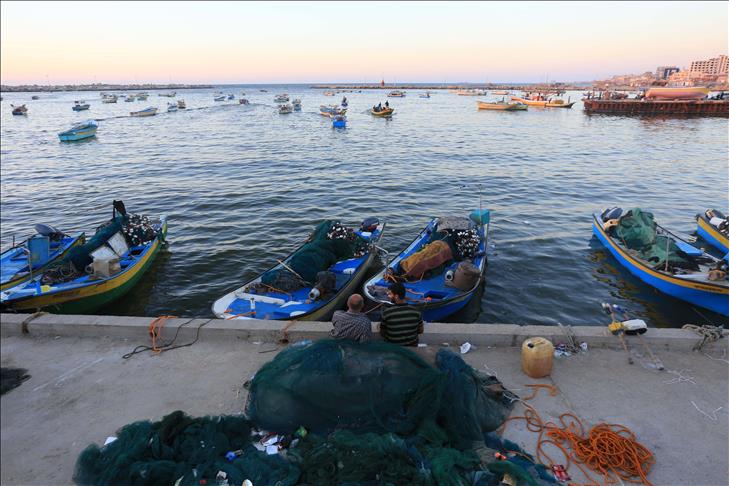
GAZA CITY
By Nour Abu Aisha
No sooner had Palestinian fisherman Mohieddin Kolab approached an Israeli navy sign with his boat 6 miles off the coast of the Gaza Strip than an Israeli boat came towards him and a soldier – speaking halting Arabic – menacingly asked him and his colleagues to return to the shore.
Kolab initially objected, as he was still within the six-mile zone in which Israel had allowed Gazan fisherman to ply their trade. But his objections prompted the Israeli soldiers to open fire near Kolab's boat, which had been carrying five fishermen in all.
Kolab said he narrowly escaped the Israeli gunfire, recalling that he had to turn back to the Gaza coast for fear of his and his colleagues' lives.
The Israeli soldiers had asked the five fishermen on board to remove their clothes and swim toward a fleet of Israeli ships.
A few minutes later, soldiers boarded Kolab's boat, searched it, and confiscated all the fishing equipment on board. Then they took the boat to the Israeli military port of Ashdod, north of the Gaza Strip.
The Israeli army later detained the fishermen and subjected them to interrogation.
"This was unprecedented for us," Kolab told Anadolu Agency. "We had worked more freely before signing the recent [August 26] cease-fire deal."
Kolab said none of his colleagues had ever been detained or had their equipment confiscated before the cease-fire agreement.
"Now, the Israeli military frequently detains fishermen on the pretext that they are violating the cease-fire deal," he said.
-No end of aggression-
Palestinian factions and Israel signed a cease-fire deal on August 26 in Egyptian capital Cairo. The deal ended Israel's 51-day military onslaught on the Gaza Strip, which left more than 2,150 Gazans dead and some 11,000 injured.
Along with a cessation of hostilities, the deal calls on Israel to reopen Gaza's commercial crossings and expand the area in which Palestinian fishermen are allowed to ply their trade to six miles off the Gaza coast.
Nevertheless, Israel has detained 11 Palestinian fishermen since the cease-fire deal was signed. The detained fishermen were released hours later after being interrogated by Israeli authorities.
Israel has also recently confiscated three fishing boats and a large motorboat, according to Nizar Ayash, head of Gaza's Palestinian Fishermen's Union.
Fisherman Mohamed Abu Auda, who was on board Kolab's boat at the time of the attack, said Israeli soldiers had led him and his colleagues to the port of Ashdod without telling them why they were being taken.
"They only told us that we had crossed the six-mile limit specified for fishing," Abu Auda said.
He insisted that he and his colleagues had not crossed the line, but had stopped before it before throwing their fishnets in the sea.
"They detained us minutes afterward," he said.
He added that all five fishermen had been interrogated by Israeli security officers who asked them why they had crossed the fishing limit and "violated the cease-fire deal."
-No change-
Abu Auda said Israel had been ratcheting up restrictions on Gaza's fishermen since 2007.
"Now Israel detains fishermen and shoots at their boats on the pretext that they're violating the cease-fire deal," Abu Auda said.
"Before the cease-fire, we used to fish in an area larger than six miles," he added, saying the Israeli navy used to issue warnings before opening fire, while it now shoots at Palestinian boats without any warning.
Kolab's fishing boat, which has now been confiscated by the Israeli navy, cost him and his family some $230,000 to build.
According to Ayash, Gaza fishermen have gained nothing from the cease-fire deal signed by Palestinian factions and Israel in late August.
"The cease-fire has not positively affected Gaza's fishing sector," Ayash told AA. "Before the cease-fire, we used to fish freely within six miles [off the coast] – now this doesn't happen."
Anadolu Agency website contains only a portion of the news stories offered to subscribers in the AA News Broadcasting System (HAS), and in summarized form. Please contact us for subscription options.

